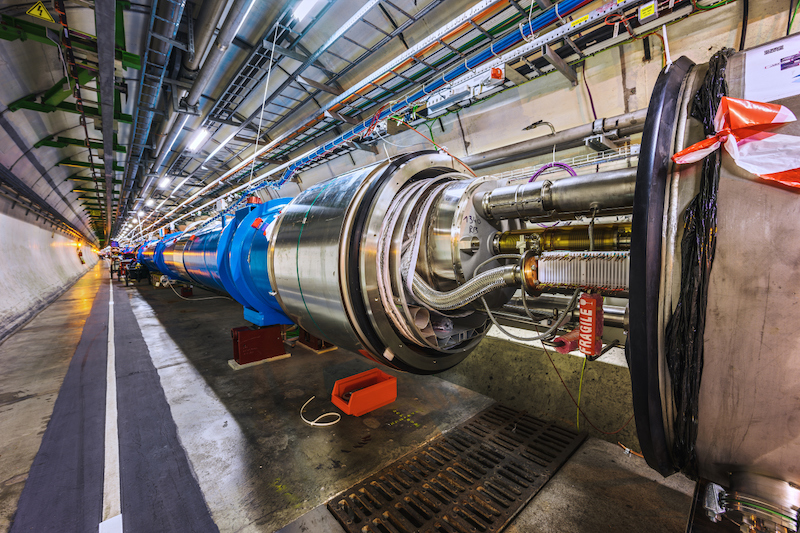
Matter to energy
Did you know that the average person (of about 165 pounds or 75 kg), has lurking in their atoms an amount of energy equivalent to about 1.6 gigatons of TNT? This is an energy about 28 times greater than the largest nuclear bomb ever exploded (Tsar bomba, Soviet Arctic, 1960, 57 megaton yield).
This means that, if for some reason your nucleons would suddenly ignite in a 100 % conversion from matter to energy (following Einstein’s famous formula), the resulting release of energy would be the equivalent of an asteroid several hundred meters across (about a quarter mile) colliding with the Earth at 17 km/s (nearly 11 miles/s). Such an explosion would completely obliterate a large metropolitan area. The surface effects, including an atmospheric shockwave would decimate everything for many kilometers around, and would send a blast of heat to incinerate everything in its path. The resulting earthquake would be severe over a wide area, and the dust and debris thrown up by this event would gradually encircle the Earth, possibly even triggering a kind of “nuclear winter” sufficient to cool the temperature of the planet for months or years, killing vegetation and then the animals and people who depend on them thousands of kilometers away.
Likelihood of self combustion extremely low
However, how likely is it that you would suddenly explode in a nuclear holocaust? Not very. And this can be calculated. Despite its youth, the theories of quantum physics might be the most studied and confirmed in the history of physics.
Quantum physics is a statistical study, and based on its laws, we can express the probability of almost anything happening. It is not absolutely impossible for all the mass in your body to suddenly transform into nuclear energy. But it isn’t likely at all. There is an equation to calculate such probabilities, but suffice it to say that you and your immediate descendants are more likely to win first in every single lottery and contest on the planet Earth, every day of every year for the next million years, than you are to spontaneously transform into nuclear energy. It is not exactly impossible, but it is about as close to impossible as anyone can imagine. In other words: There are better things to worry about.
The Large Hadron Collider and likelihoods of mini black holes
This brings us to the CERN’s Large Hadron Collider (LHC), the latest “atom smasher” that was constructed between 1998 and 2008. It has been producing a lot of science since its upstart, for example the confirmation of the Higgs boson in 2012. You may have heard that it has been theorized that there is a chance this collider could produce “mini” blackholes that in the most indescribably unlikely of scenarios, could damage the Earth. But, as with the chances of you suddenly detonating, the chances of any harm due to the LHC is unimaginably small.
It is not so unimaginable that the LHC could produce “mini” blackholes, but these are not anything like the black holes that would normally come to mind (stellar black holes as the remains of a large star after it has exploded in a supernova, or supermassive black holes astronomers now are able to image in the centers of galaxies). The “mini” black holes that the LHC could produce – although still unlikely – would be microscopic at best, and “unstable”, which just means that they could last at most only a tiny fraction of a second. In other words, they would “evaporate” more or less immediately. Also, their mass would be far too small to produce enough gravity to pull in matter even as large as a microbe.
The danger with The Large Hadron Collider lies elsewhere …
The real threat about the LHC lies not in what it can prodice, but rather in the unbridled fears promulgated by uninformed people. This is nothing new, but today’s absurdities spread with the speed of light through the Internet, and can have potentially deleterious affects on genuine and well-founded research.
There is far, far, far more potential harm in the outcome of any election season than there is of even the smallest hair on your head igniting in a bizarre nuclear transformation.
Keep in mind that physicists are people, too, not the “mad scientists” of moviedom. They have families. They love life as much as anyone else, and would not pursue the LHC and related technologies if they felt that there was any reasonable concern about safety. Also keep in mind that physics is the most basic study of nature. They are looking for truth. Yes, physicists developed the atomic and nuclear bombs, but that was under order from politicians. If you trust anyone, trust physicists, not politicians. Politicians sometime have to make the decision to go to war, and sometimes that is justified and should not be criticized (although sometimes it should be). As Mark Twain said: “Loyalty to country always. Loyalty to government, when it deserves it.”
In general, physics is a search for truth. The same is true for other sciences. Politics is a search for votes and power. Trust physics.
(As clarification, the transformation of energy in a nuclear (fusion) bomb and in the Sun is not 100 conversion of all matter involved into energy. In fact it is on the order of 1 to 2 percent. The only process that we know of that reliably converts 100 percent of mass into energy is a matter-antimatter interaction — and yes, that is what they talk about in Star Trek and in fact has been demonstrated many times on a very small scale.)
Special thanks to the Dr. David Morrison and the Asteroid and Comet Impact Hazards (NASA) website.











